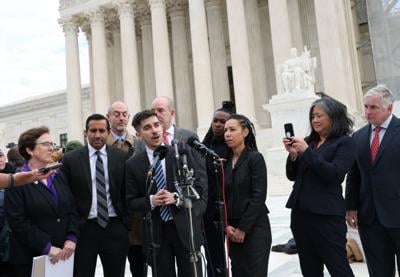Tennessee was on the national stage again Wednesday as the Supreme Court of the United States heard oral arguments for and against the state’s ban on gender-affirming care for minors in U.S. vs. Skrmetti.
Three Tennessee families with trans children, a Memphis physician, the ACLU, the federal government and other legal entities on the side of the U.S. sought to prove that the law violates the 14th Amendment’s Equal Protection Clause.
ACLU looks to sue as legislation makes parents of trans children question their future in state
With a conservative majority of justices (six to three), the plaintiffs face an uphill battle to win the votes of at least two conservative justices, which would prevent the ban on puberty blockers, hormone therapy and — in rare cases — surgeries for trans youth. At least 25 states have similar laws banning such care. Trump-appointed Justice Neil Gorsuch wrote the majority opinion when the court ruled four years ago that firing trans workers because they are trans is a form of illegal sex discrimination. (Gorsuch did not ask any questions during Wednesday’s proceedings.)
Tennessee Attorney General Jonathan Skrmetti has characterized the case as protecting “vulnerable kids from risky and unproven medical practices.” He also wrote an opinion piece on the case for The Tennessean this week.
Tennessee’s legal team argued this week that gender-affirming care restrictions are in the same vein as abortion restrictions — they regulate a medical procedure. The American Academy of Pediatrics and the American Academy of Family Physicians support access to gender-affirming care.
“Tennessee’s General Assembly reviewed the medical evidence, as well as the evidence-based decisions of European countries that restricted these procedures, and ultimately passed this bipartisan law prohibiting irreversible medical interventions,” says Skrmetti in a statement. “The plaintiffs in this case are asking the Court to take the power to regulate the practice of medicine away from the people’s elected representatives and vest it in unaccountable judges.”
Class-action suit against VUMC alleges Skrmetti knew which records to seek, hospital did nothing to fight for patients’ privacy
Skrmetti echoed what Trump-appointed Justice Brett Kavanaugh spoke about during the arguments — in the U.K., gender-affirming medication for minors can be prescribed only as part of research. However, no European country has categorically banned gender-affirming care for youth. Chief Justice John Roberts and Justice Amy Coney Barrett expressed hesitation to overrule a state ruling.
During the proceedings Wednesday, potential outcomes were discussed — one possibility is that the court could write a narrow opinion that instructs lower courts to demand more evidence from states instituting these types of bans. Arguing on behalf of the plaintiffs, Chase Strangio — the first trans person to argue in front of the court — pointed to legislation in West Virginia that did not ban gender-affirming care, but added additional stipulations.
During the 2023 legislative session, restricting care for transgender youth was a top priority for some Tennessee legislators, and the law debated before the Supreme Court Wednesday was the first bill filed.
“My heart — and the heart of every transgender advocate fighting this fight — is heavy with the weight of what these laws mean for people’s everyday lives,” said Strangio, co-director of the ACLU’s LGBTQ & HIV Project. “But I also know that every out trans person has embraced the unknown in the name of living free from shame or the limits of other people’s expectations. By virtue of being a trans person, each of us has chosen hope over despair. And as all parents know, when your child is suffering, you are suffering. My heart aches for the parents who spent years watching their children in distress and eventually found relief in the medical care that Tennessee now overrides their judgment to ban. Whatever happens today, tomorrow, and in the months and years to come, I trust that we will come together to fight for the realized promise of our Constitution’s guarantee of equal protection for all.”
A ruling is expected in late spring 2025.







